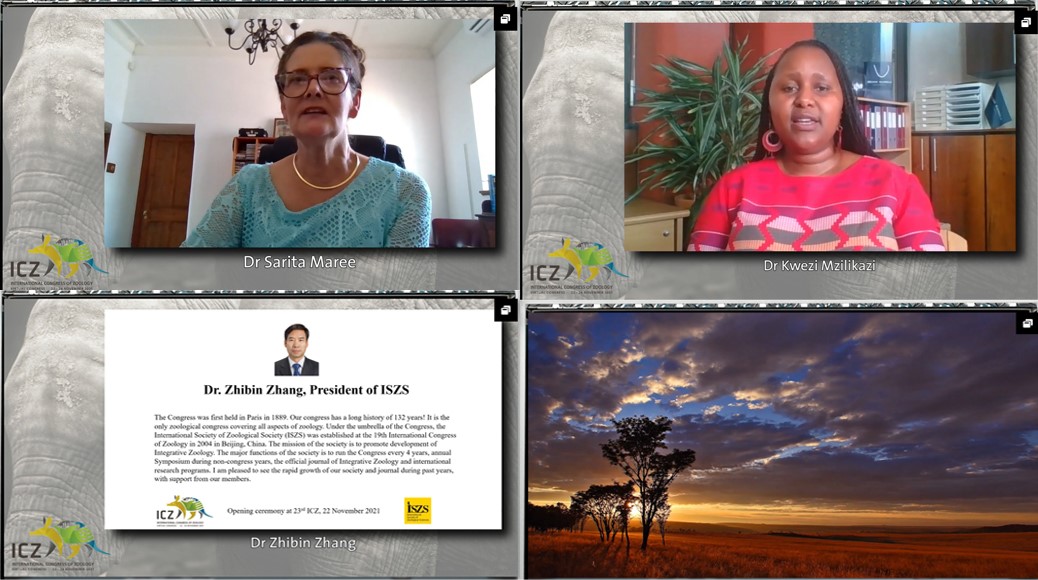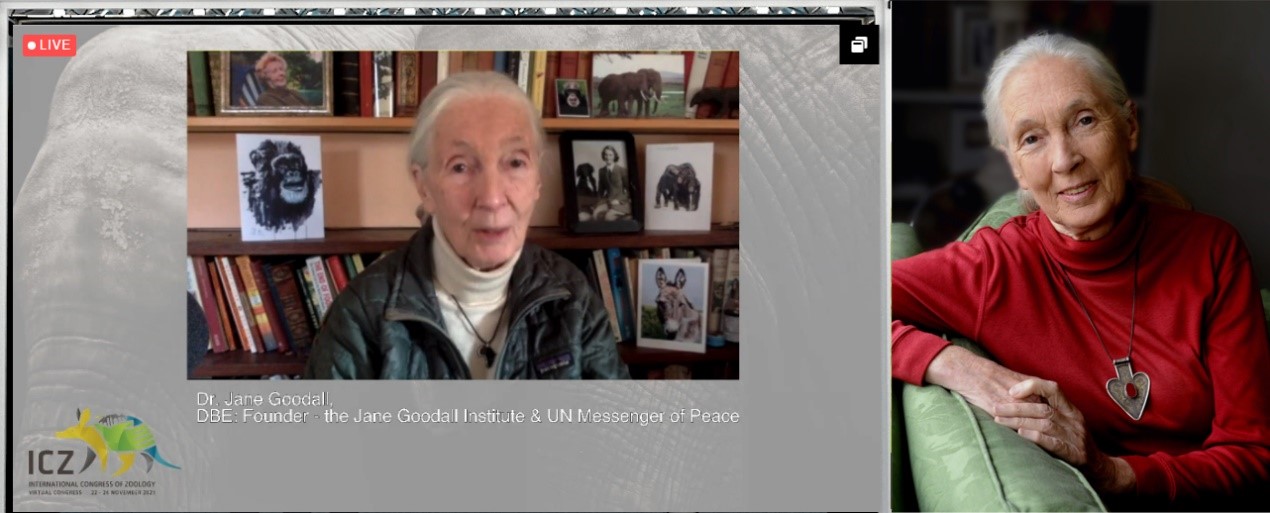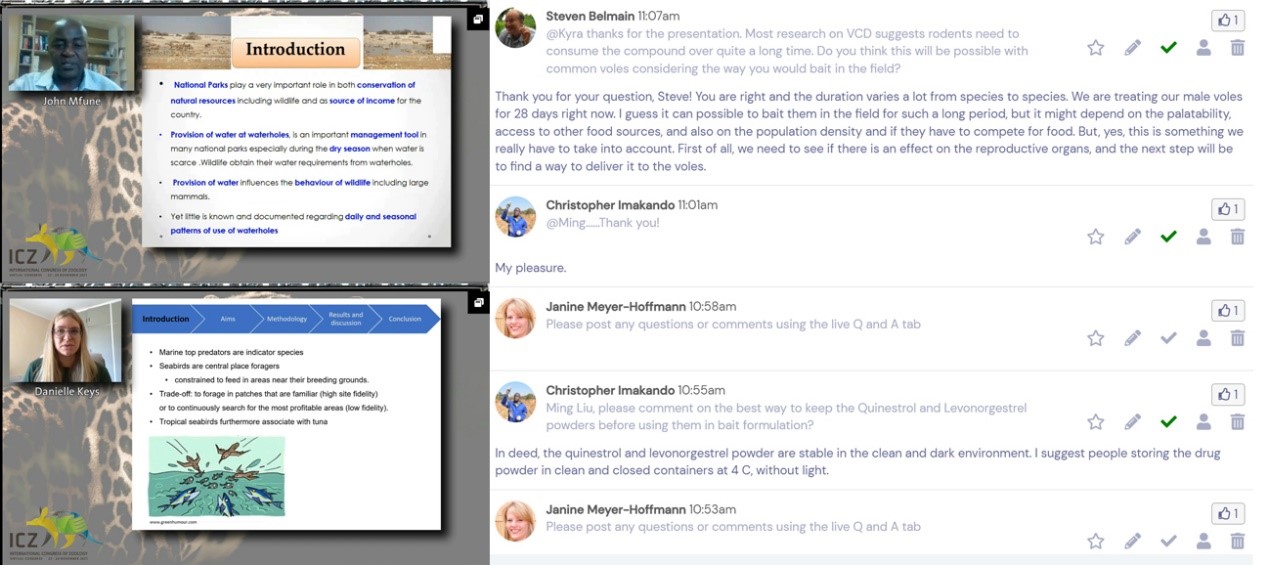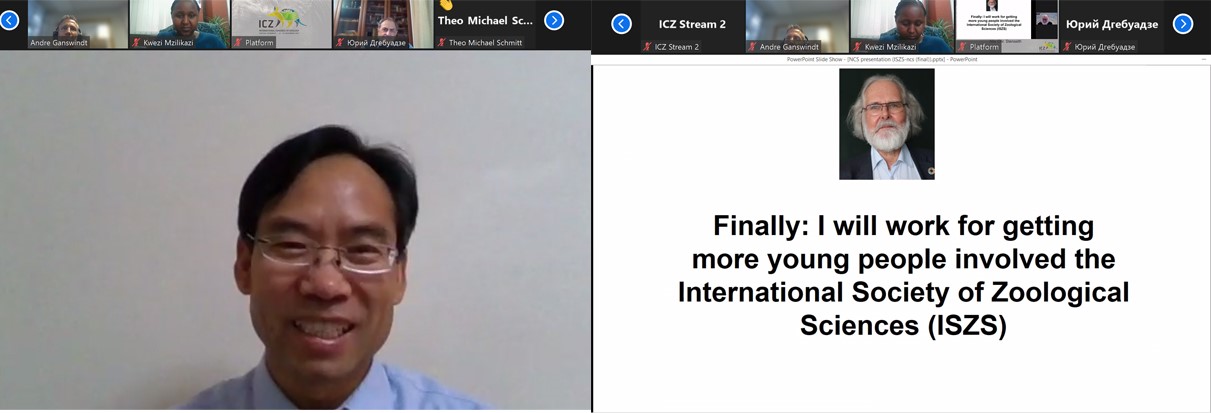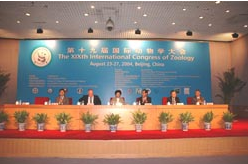Home > INTERNATIONAL CONGRESSES > ICZ > ICZ History
The virtual 23rd International Congress of Zoology (ICZ) was held from November 22 to 25, 2021. The congress was supposed to be held in Cape Town, South Africa 2020. Due to COVID-19 pandemic, it was postponed and eventually changed to a virtual congress. About 400 zoologists, researchers and students from more than 30 countries attended. The theme of the congress was "Zoology in the Anthropocene – a Holistic Integrated Approach to Conservation", which included five subjects: climate change; urban ecology; biodiversity conservation: bridging science, policy and economics; threats in the Anthropocene; water: implications of water scarcity and water pollution on human and animal life. The congress was organized by the International Society of Zoological Sciences (ISZS) and hosted by the Zoological Society of Southern Africa (ZSSA). Sponsors include South Africa's National Research Foundation (NRF), Oppenheimer Generations Research and Conservation, the International Union of Biological Sciences (IUBS), China Association for Science and Technology (CAST), the Bureau of International Cooperation functions of the Chinese Academy of Sciences, Institute of Zoology of Chinese Academy of Sciences, and so on.
At the opening ceremony, conference chair Dr Kwezi Mzilikazi, co-chair Dr Sarita Maree and ISZS president Zhibin Zhang delivered opening remarks. Video montage of South Africa was played after the opening remarks.
The opening ceremony
The congress was consisted of one special sessions, 10 plenary sessions, 25 parallel sessions, 3 panel discussions and a poster section. Dr. Jane Goodall, an internationally renowned conservationist, was invited to give a speech for the special session. The 10 plenary sessions were "No species left behind: using science to conserve wildlife corridors" by Professor Paul Beier from the University of Northern Arizona, US; "Weaving nature-based solutions into international climate policies: making the case for species" by Prof. Camille Parmesan from the University of Plymouth, UK; "Biodiversity loss: Global challenges and local opportunities for urgent action!" by Luthando Dziba, managing executive of SANParks; "Climate change, habitat fragmentation and maintaining viable ecological communities and metapopulations" by Prof. Marcel Holyoak from the University of California, Davis; "Conservation genomics of endangered wildlife" by Prof. Wei Fuwen from the Institute of Zoology, Chinese Academy of Sciences; "The uMzimkhulu river - the last significant free flowing river in South Africa" by Prof. Anthony Turton from the University of the Free State, South Africa; "African small mammals: Neglected yet important" by Prof. Ara Monadjem from the University of Florida; "Medaka (Japanese killifish) genetics and genomics - new insights into vertebrate development and evolution" by Prof. Takeda Hiroyuki from the University of Tokyo; "Evolution and ecology of plague: a disease of today which changed our history" by Prof. Nils Stenseth from the University of Oslo, Norway; "Show me the honey: the natural history of a bird-human mutualism "by Prof. Claire Spottiswoode from the University of Cambridge, UK.
Invited speaker: Dr. Jane Goodall
The 25 Symposium topics were: the importance of ecological connectivity for biodiversity conservation; urban ecology: urbanization patterns and impacts; globalization and invasive species; implications of water scarcity and water pollution on human and animal life; biodiversity and conservation; conservation and ecology; other conservation issues; climate change: impacts; urban ecology: urbanization, habitat loss and other impacts; wildlife on edge: coexistence and conflict between people and wildlife; pollution; zoonotic diseases; bird conservation; fertility control of rodent pests for better agriculture, ecosystem and human health; climate change: responses; conservation and evolution; conservation and physiology; evolution and behavior; animal plant interaction; response of terrestrial mammals to climate change; conservation and invertebrates; impacts of human activities on wildlife; habitat loss and fragmentation: impacts and responses; in search for general laws in organizing living system; how NGO’s collaborations can tackle the global issues. The session of zoonotic diseases was co-organized by the Zoonotic Disease Working Group of IUBS and ISZS. The president of IUBS, Professor LS Shashidhara of the Indian Institute of Science Education, delivered a speech for the session. Dr. Nathalie Fomproix, the Executive director of IUBS, attended the symposium. All sessions of the congress included 205 oral presentations. Three panel discussions were: threatened species in South Africa’s marine protected area (MPA) network; genetic management guidelines for African mammals; and responsible hunting contributing to the conservation of Africa’s species and ecosystems. There were nearly 40 online posters.
Session and discussion
The General Assembly was hold on November 23 and was chaired by Prof. Zhibin Zhang, President of ISZS. John Buckeridge, chairman of ISZS Advisory Committee, delivered a speech. He highly recognized and appreciated what ISZS had accomplished and was confident of a bright future of ISZS. Dr Liu Ming from the secretariat summarized the activities achieved in the past five years. Dr Xiong Wenhua reported the progress of the official journal Integrative Zoology. The new Executive Committee was elected at the General Assembly (for the period of 2021- 2024). Prof. Yiyu Chen was invited to be the honorary president of ISZS. Prof. Nils Chr. Stenseth of the University of Oslo, Norway, was elected as the new president. Prof. Zhibin Zhang of the Institute of Zoology, Chinese Academy of Sciences was elected to be the executive director. The other new EC members and AC members are: Prof. Sarita Maree from the Department of Genetics, University of Pretoria, South Africa (Vice President), Prof. Yvon Le Maho from the National Center for Scientific Research (Centre national de la recherche scientifique, CNRS) France (Executive Member), Prof. Yury Yu. Dgebuadze from the Severtsov Institute of Ecology & Evolution, Russian Academy of Sciences, Russia (Executive Member), Prof. Marcel Holyoak from the University of California, Davis, USA (Executive Member), Prof. Hiroyuki Takeda from the University of Tokyo, Japan (Executive Member), Prof. Yoshitaka Nagahama from the Ehime University, Japan (Advisory Member), Prof. Jürgen Heinze from the University of Regensberg, Germany (Advisory Member), Prof. Mauricio Lima from the Pontificia University of California, Catolica de Chile, Chile (Advisory Member) and Dr Chunxu Han from ISZS Secretariat , China (Advisory Member).
The closing ceremony was chaired by Prof. Zhibin Zhibin on November 24. Andre Ganswind, President of the Zoological Society of Southern Africa, delivered a speech. He thanked the Organizing Committee and ISZS for organizing such a successful conference, and expressed that the conference promoted the communication of zoological studies between South Africa and the rest of the world. Award recipients were recognized as part of the closing ceremony. Prof. Takeda Hiroyuki from the University of Tokoy, Japan and Prof. Michael Schmitt from Ernst Moritz Arndt University, Germany received the Outstanding Contribution Award for their support to ISZS in the past years. The Young Scientist Award recipients were: Dr Eric I Ameca from Mexico, Dr Zhou Youbing from China and Dr Kevin D Kohl from the United States. Prof. Nils Chr. Stenseth delivered a speech. He recognized that ISZS has run very well and had remarkable achievements, which was inseparable from the strong guidance of the last executive committee and hard work of the secretariat. He also had confidence in leading the society to a better future.
The closing ceremony
